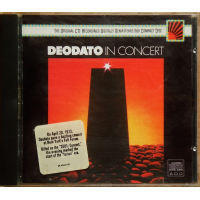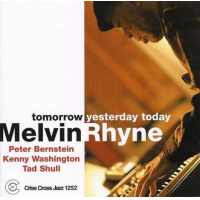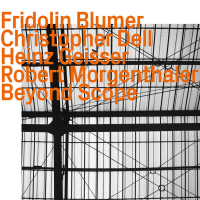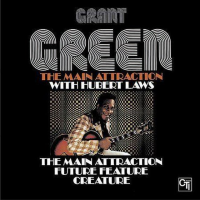Home » Jazz Articles » Liner Notes » Mike DiRubbo: Human Spirit
Mike DiRubbo: Human Spirit
The strides that DiRubbo has made in developing an individualistic voice and style are even more remarkable when one considers that unlike many of his contemporaries, the saxophonist's exposure to jazz in general was limited prior to his college days. "As far as jazz goes, I didn't have much training until I went to Hartt," DiRubbo says. "But I always had a decent ear and would be picking stuff up and playing along with the radio. It was never like my parents had to tell me to practice because I was always into it. It was really the sound of the tenor though that was the thing. I was really in love with that sound."
In the creative environment of Hartt, DiRubbo not only had the opportunity to study with Jackie McLean, but also to develop relationships with a few peers who would shortly be making names for themselves on the New York scene. "I made acquaintances with some people that I still work with, like Steve Davis for instance. In fact, he's been one of my biggest supporters over the years." Indeed it would be through the efforts of Davis that DiRubbo would be brought to the attention of Criss Cross followers, with the saxophonist appearing on several of the trombonist's sides for the label, including The Jaunt (Criss 1113), Crossfire (Criss 1152), Vibe Up! (Criss 1178), and Systems Blue (Criss 1218).
Stepping out of the shadows into the role of leader, DiRubbo's would soon be cutting his own first effort for Criss Cross, the critically acclaimed Keep Steppin' (Criss 1205). "Loosely basing the music within the parameters of hard bop," writer David Orthmann comments in a review of the album, "DiRubbo takes this part of the jazz tradition and, by the sheer resoluteness of his playing, forges something potent and essential." In fact, these few words do indeed capsulate the essence of DiRubbo's approach, one that is largely steeped in the Blue Note tradition of the '60s, but which also includes elements such as the buttery tone of Johnny Hodges and the implications of Coltrane's "sheets of sound."
A worthy successor to his maiden voyage, Human Spirit speaks to more recent advances in DiRubbo's musical quest and it's a session that went down easily with almost all the performances being first takes. Once again the front line features Jim Rotondi and the trumpeter makes another strong showing as one of the most talented musicians in a lineage following such incendiary masters as Hubbard and Shaw. "When I play with Jim," says DiRubbo, "it allows me to do what I do and it's a natural feeling, coming from the same place musically. I like to play with people that I have some kind of rapport with and it's a little more like a family thing."
Undoubtedly a familial bond exists between pianist David Hazeltine, bassist Peter Washington, and drummer Joe Farnworth, the trio accounting for one half of the all-star sextet One For All, not to mention their scores of appearances together in support of a variety of leaders and functions. "The thing about Dave is that not only is he a virtuoso pianist," DiRubbo explains, "but his arranging abilities are such that he has his own sound as an arranger."
Speaking of Washington and Farnsworth, somewhat of a modern day counterpart to such memorable teams as Paul Chambers and Philly Joe Jones or Ron Carter and Tony Williams, DiRubbo states, "Peter's playing just adds another dimension to all of the music. As a mater of fact, Throwback was written with him in mind. As for Joe, he always gives 110% and the groove and the energy that he puts into the ride cymbal is always there. I mean it feels like he's not going to let me fall off the high wire and I feel like there's a lot of things I can do and I'm going to always land on my two feet with him."
It's Farnsworth who kicks off Transfer, an up tempo swinger that sets things in motion without wasting so much as a note. "I was thinking about Cedar Walton when I wrote this one. I had in mind the idea of being in a hurry for a gig and having to make a transfer in the subway station and how hectic that can be, running up a couple of stairs to make the transfer from one train to the next." With the exception of Washington, all hands on deck get to speak their piece before things come to a close.
As far back as 1961, Wayne Shorter picked up on the inherent jazz dynamics associated with Henry Mancini's Moon River, arranging a version heard on Art Blakey's Blue Note date Buhaina's Delight. Here in the hands of David Hazeltine, we have yet another inspired reading which adds one more chapter in the pianist's growing book of modern standards given new life via clever reharmonization and rhythmic ingenuity. The melody itself is set off by a Latin-tinged vamp and a few bars of ¾ thrown in for variety.
Human Spirit is in many ways the centerpiece of the entire session. With its lilting waltz groove, DiRubbo's uplifting melody is delivered with great sensitivity and in the spiritual vein that its title suggests. "It's about positive energy and being in the key of D always makes me feel positive." Mainly a forum for DiRubbo's alto, his solo is filled with trinkets of melodic inspiration, not to mention a few Coltrane-inflected runs to boot. Hazeltine delivers his own short commentary marked by a sage use of block chords.
It's then off to the races for a mercurial romp through Jackie McLean's Minor March, a line first heard on a 1955 Prestige session that found its composer sharing the microphone with Miles Davis and Milt Jackson. As to its inclusion here, Mike says, "I feel like I'm far enough away from having been at school with Jackie and I had never actually recorded one of his tunes. But we needed something up tempo for the date and so we did this one as a tribute to him, although I did change up the bridge and put some Coltrane substitutions on it." Solos from DiRubbo, Rotondi, and Hazeltine precede a commanding duet section where the altotist and Farnsworth go it alone.
Things slow down to a ballad tempo for the poignant DiRubbo original North Shore Reflections. "My girlfriend Lauren is from a small town on the north shore of Long Island and where her folks live you can walk to the beach, so we spend as much time there as we can to get away from the city. They have a piano at the house because her mom plays some classical music and the tune came to me there one day when I was messing around at the piano." In addition to statements from Hazeltine and Rotondi, Di Rubbo delivers a superb extended cadenza at the piece's conclusion.
From Hank Mobley's 1967 classic Far Away Lands comes Bossa For Baby and the balance that Jim and Mike get in voicing the opening melody is both highly polished and seemingly effortless. "This is another tribute to one of my favorite musicians and I don't mean necessarily just playing wise, but more his records in general. I mean, I've worn the crap out of all those Hank Mobley Blue Note records." Save for Washington and Farnsworth, everyone takes a solo on this one.
"I'm a big sports fan and I love when they talk about certain baseball players as being a throwback from another generation. And I think a lot of the guys that I hang around with, as far as jazz musicians, are throwbacks to people you read about in books and stuff." This then is the genesis for Throwback; a likable bop-inflected number that as previously stated is linked to the rock solid work of Peter Washington. As such, the bassist steps in the spotlight for his only solo of the date, following statements from DiRubbo, Rotondi, and Hazeltine.
Wrapping things up is the Rotondi original Down, a brisk flag waver that seems the antithesis of its title. DiRubbo, Rotondi, and Hazeltine get their say and then go around in the same order as they trade bars with Farnsworth. Optimistic and swinging, the quintet then exits the same way they came in.
Certainly as things go, Human Spirit is a recording made in the character of the mainstream tradition, yet it speaks for a new generation of artists who are reaching beyond the groundwork in developing their own personal voices. "Sometimes critics are fond of putting musicians into pigeon holes, like this guy is a hard bopper and that's it," DiRubbo claims, "and that's not what I'm all about." Without question, anyone with an open mind should have no trouble seeing that DiRubbo speaks the truth, both in his words and his music.
Liner Notes copyright © 2026 C. Andrew Hovan.
Human Spirit can be purchased here.
Contact C. Andrew Hovan at All About Jazz.
An avid audiophile and music collector, Chris Hovan is a Cleveland-based writer / photographer / musician.
Track Listing
Transfer; Moon River; Human Spirit; Minor March; North Shore Reflections; Bossa For Baby; Throwback; Down.
Personnel
Mike DiRubbo
saxophone, altoJim Rotondi
trumpetDavid Hazeltine
pianoPeter Washington
bassJoe Farnsworth
drumsAlbum information
Title: Human Spirit | Year Released: 2003 | Record Label: Criss Cross
Tags
PREVIOUS / NEXT
Support All About Jazz
 All About Jazz has been a pillar of jazz since 1995, championing it as an art form and, more importantly, supporting the musicians who make it. Our enduring commitment has made "AAJ" one of the most culturally important websites of its kind, read by hundreds of thousands of fans, musicians and industry figures every month.
All About Jazz has been a pillar of jazz since 1995, championing it as an art form and, more importantly, supporting the musicians who make it. Our enduring commitment has made "AAJ" one of the most culturally important websites of its kind, read by hundreds of thousands of fans, musicians and industry figures every month.
























